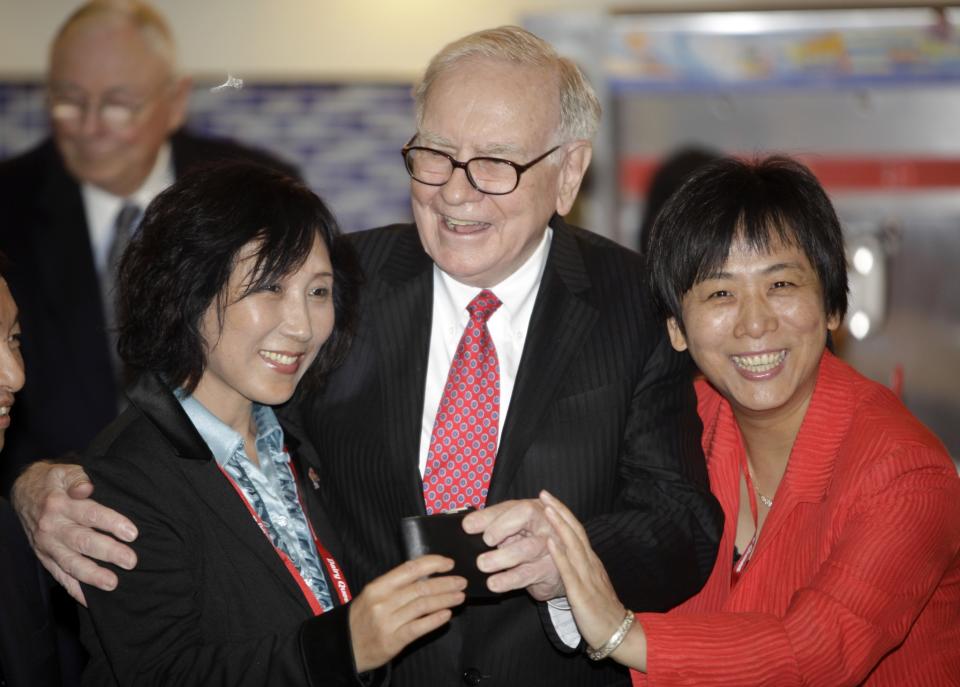Why Chinese investors love Warren Buffett
Warren Buffett, 86, has arguably become America’s most famous investor. But it’s become clear recently that the Omaha, Nebraska-based billionaire also has a cult following in China.
In April, Yahoo Finance reported that Buffett, CEO of Berkshire Hathaway (BRK-A, BRK-B), had agreed to let Coca-Cola put his likeness on Cherry Coke cans for the drink’s launch in China. Coke, whose shareholders include Berkshire, likely knew the “Oracle of Omaha” would help sell Cherry Cokes in that country.
After all, thousands of Chinese investors attended Berkshire’s annual meeting last year. Berkshire live-translated that meeting into just one other language, according to the local paper in Omaha — Mandarin.
So why do Buffett and Berkshire have such broad appeal in China?
“Values that resonate with many Chinese”
“[Warren Buffett] represents someone who managed to become wildly successful because of his own smarts and hard work as opposed to relying on cronies and corruption in their mind,” says Ann Lee, a leading expert on the Chinese economy who has taught at New York University and China’s Peking University.
She added: “Those are values that resonate with many Chinese.”
While China launched a sustained crackdown against its rampant corruption back in 2015, Buffett has a reputation for integrity. In a 2014 memo to his managers, he urged them to avoid engaging in unethical behavior even if it’s technically legal.
“We must continue to measure every act against not only what is legal but also what we would be happy to have written about on the front page of a national newspaper in an article written by an unfriendly but intelligent reporter,” Buffett wrote.
Buffett engages in value investing, meaning he buys stakes in companies he believes are trading for less than they’re worth. Berkshire owns many companies including See’s Candies and Kraft Heinz, and Lee says retail investors in China have a lot to learn from his approach.
“Retail investors usually don’t have the financial means to buy entire companies,” she said, “but they should understand that was the way Buffett made his fortune which has little to do with speculation.”
Even when Berkshire doesn’t buy companies outright, it’s often in for the long haul. For example, Berkshire bought $1 billion in Coca-Cola (KO) stock in 1989. Since then Buffett had to fend off criticism over Coke’s contributions to obesity. In doing so, he managed to come off as a sincere fan of the company, mainly because he’s often seen holding a Cherry Coke.
“I was in the right place at the right time”
The Oracle’s love of Cherry Coke likely inspired the company to put his face on the drink for its Chinese audience. After the release of Buffett’s Cherry Coke Cans, Yahoo Finance asked him to explain why he believes he’s so popular in China.
“I think my ‘popularity’ in China is due to the huge interest in stocks in China that has developed in just a couple of decades. I was in the right place at the right time as the Chinese looked around for famous investors,” Buffett said in an email to Yahoo Finance. “I also made a couple of visits to China that received a fair amount of publicity and several American books about me got widely distributed throughout China.”
Those visits included a 2010 trip Buffett took with Bill Gates to encourage China’s wealthy to engage in philanthropy. In his email to Yahoo Finance, Buffett also mentioned that Chinese TV has covered Berkshire Hathaway’s annual meeting in Omaha, Nebraska, and that Berkshire has made investments in both PetroChina and the Chinese car maker BYD Auto.
“Also, they like old guys; Charlie’s my only competition,” added Buffett, referring to 93-year-old Berkshire Hathaway Vice Chairman Charlie Munger.
The Oracle capitalizes on China’s interest in real estate
Buffett’s appeal to China isn’t a one-way street; he’s also interested in Chinese investment opportunities. Specifically, Berkshire is capitalizing on a growing interest in US real estate among Chinese buyers — with 45% of foreign buyers of residential real estate coming from China, according to a June report.
This month, a real-estate brokerage controlled by Buffett announced a deal with China’s largest international property website to help lure wealthy Chinese homeowners to the US. Reuters reported that Berkshire Hathaway HomeServices hoped that Buffett’s popularity in China would benefit the deal with Juwai.com.
However, Berkshire had something to offer Juwai beyond Buffett’s fame.
“Clearly Juwai got something out of being associated with Buffett and Buffett obviously benefitted from the deal too,” Lee said. “The deal merely underscores that both sides see it as an opportunity to increase sales for them. Buffett’s name recognition was probably a secondary consideration.”
Read more:
12 Warren Buffett quotes that will make you smarter about money
Exclusive: Warren Buffett’s money managers speak
Buffett: We should embrace free trade even if it hurts some people


